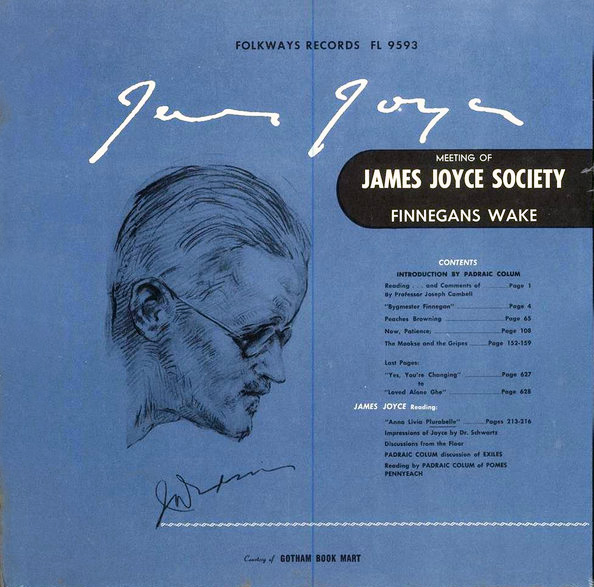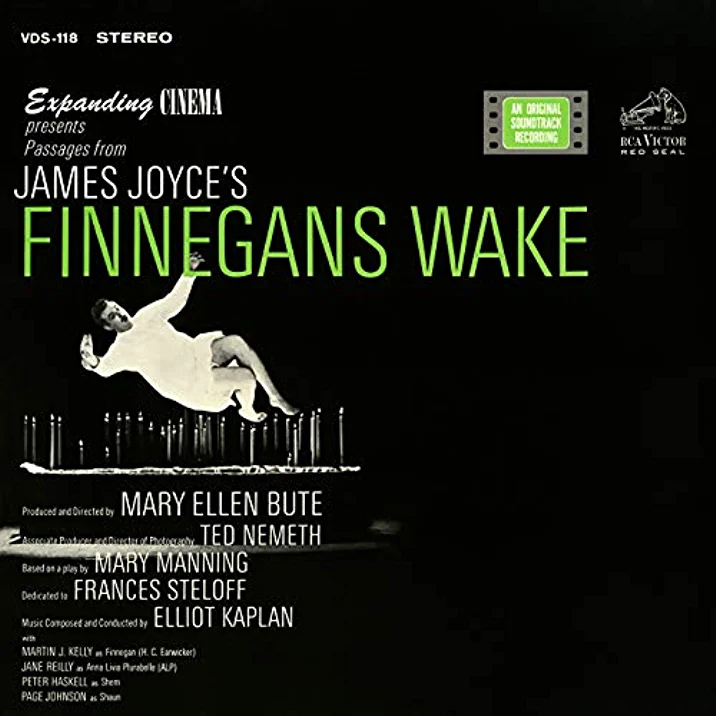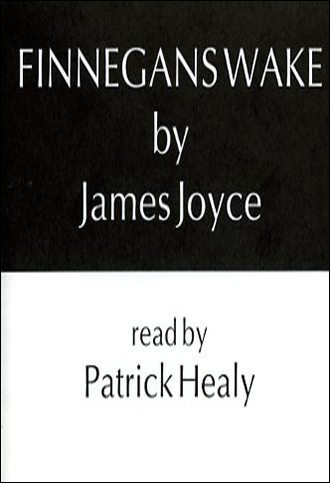Joyce Audio – Audiobooks: Finnegans Wake
- At January 01, 2023
- By Great Quail
- In Joyce
 1
1
Joyce Audio: Finnegans Wake
This page profiles professional and commercial recordings of Finnegans Wake. Most links take you Amazon, where you may listen to samples and download digital “aax” files for your Audible-enabled device. Other media such as LP, cassette, CD, MP3, and FLAC are listed separately.
Recommendations
For visitors who just want a quick recommendation, pick up the unabridged Naxos Wake with Barry McGovern and Marcella Riordan. It’s inexpensive, easily obtainable, and really very good.
Joyce Audio
[Main Page | His Own Voice | Collections | Dubliners | Portrait | Ulysses | Finnegans Wake | Drama & Poetry | Biography & Criticism | Miscellany]
James Joyce Reading “Anna Livia Plurabelle”
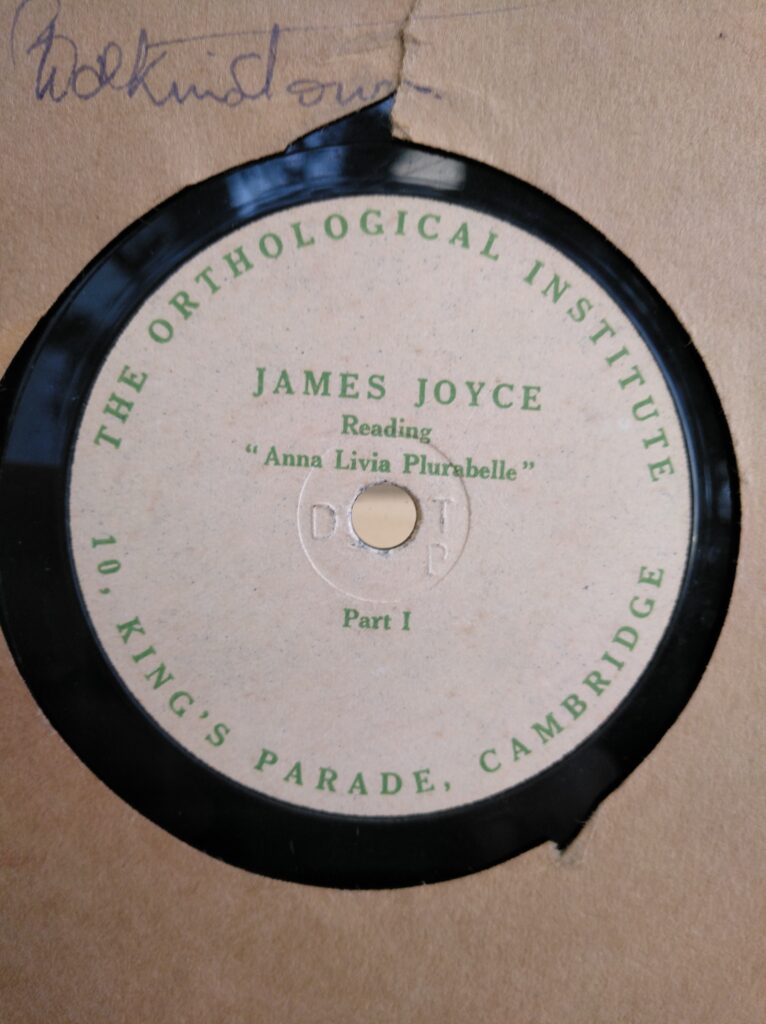
James Joyce Reading “Anna Livia Plurabelle”
Read by James Joyce
Orthological Institute, 1929
In 1929 James Joyce was recorded reading from Anna Livia Plurabelle, which would later become part of Finnegans Wake. The completely history of this recording may be found in “James Joyce—In His Own Voice.”
Meeting of James Joyce Society on October 23, 1951—Finnegans Wake
Meeting of James Joyce Society on October 23, 1951—Finnegans Wake
Read by James Joyce, Joseph Campbell, Padraic Colum, etc.
Folkways, 1960
Also available as: Internet Archive FLAC | YouTube
Abridged; 57 minutes.
This 2-LP set captures a meeting of the James Joyce Society at their usual haunt in New York City’s Gotham Book Mart. Not just any meeting, but a special session devoted to Finnegans Wake and featuring American mythologist Jospeh Campbell, who had recently published The Hero with a Thousand Faces. Although Padraic Colum was an actual friend of Joyce’s, “Professor Joseph Campbell” is clearly the star of the show. He reads several sections from Finnegans Wake, pausing intermittently to explain or gloss the text. As the co-author of A Skeleton Key to Finnegans Wake (1944), the first—and by 1951, only—book of Wake criticism published since Joyce’s final work hit the shelves in 1939, Campbell’s interpretations were more than novel, they were groundbreaking. He reads the Wake with authority, taking obvious delight in difficult passages such as the 100-letter “thunderword.” Having said that, his readings lack the fluidity and grace of Joyce’s own, or the poetic drama that Cyril Cusack would bring to “Shem the Penman” a few years later. But even more enjoyable than Campbell’s reading is the reaction of his audience. This group actually knows the Wake, and finds it funny, laughing at times when an uninitiated ear might find bafflement and confusion. Though it was recorded over 70 years ago, to a fellow fan of the Wake, hearing this laughter feels like coming home. As a bonus, Folkways includes Joyce’s own 1929 recording of Anna Livia Plurabelle, a rather hard-to-find commodity in 1960.
The second album is less interesting than the first, and consists of lectures and discussions, including Padraic Colum’s surprisingly Catholic defense of Joyce’s oft-maligned play, Exiles. The meeting concludes with Colum reading “She Weeps Over Rahoon” from Pomes Penyeach, followed by comments on his own role in the U.S. publication of Dubliners.
Contents:
Disc 1
A1. Padraic Colum Comments
A2. Reading of and Comments on Page 1, By Professor Joseph Campbell
A3. Reading from “Bygmester Finnegan” and Comments
A4. “Peaches Browning” Page 65
A5. “Now, Patience” Page 108
A6. Continuation (“Now, Patience”) Page 109
B1. Mookse and the Gripes “As My Explanations Here…”
B2. Mookse and the Gripes (cont’d) “I Am Rarumominum…” Page 104
B3. Mookse and the Gripes (cont’d) “And They Viterberated….” Pages 157-159
B4. Last Pages: “Yes, You’re Changing….” Page 627 to “….loved Along The” Page 628
B5. End of Reading By Professor Joseph Campbell
B6. James Joyce Reading “Anna Livia Plurabelle” Pages 213-216 “Well, You Know Or Don’t You….” to “….waters of Night!”
Disc 2
C1. Impressions of Joyce By Dr. Schwartz
D1. Continuation (of “Impressions of Joyce By Dr. Schwartz”)
D2. Discussions from the Floor
D3. Padraic Colum Discusses Exiles
D4. Reading By Padraic Colum of Pomes Pennyeach. End of Meeting
Finnegans Wake: Anna Livia Plurabelle & Shem the Penman
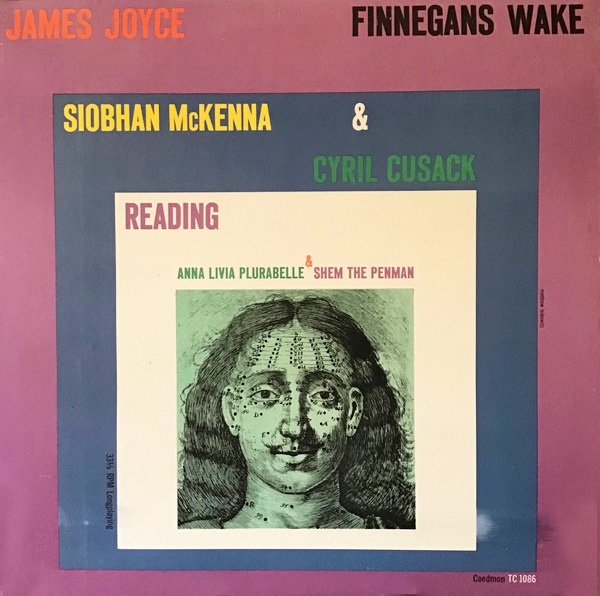
Finnegans Wake: Anna Livia Plurabelle & Shem the Penman
Read by Siobhán McKenna & Cyril Cusack
Caedmon, 1959
Also available as: LP | Brazen Head MP3 | Audible
Also available on: The James Joyce Audio Collection
Abridged; 60 minutes, 50 seconds.
A brief history of Caedmon Records and their many James Joyce recordings may be found in “Audiobooks: Collections.” This LP was released in 1959, and features two Irish Shakespearean actors working under the direction of Howard O. Sackler. Siobhán McKenna (1922-1983) reads the last few pages of “Anna Livia Plurabelle.” Her rendition is electrifying, rattled out flawlessly like a torrent of juicy gossip, winding down to an exhausted, lonely whisper as the washerwomen slowly transform. On the flip side, an excerpt from “Shem the Penman” is read by Cyril Cusack (1910-1993) in a poitín-soaked palaver that brilliantly illuminates Joyce’s mercurial prose. A must-hear for any Joycean, there’s a reason these recordings have never gone out of print!
Finnegans Wake (Excerpts)

Finnegans Wake (Excerpts)
Read by Patrick Bedford
Spoken Arts, 1963
This LP collects excerpts from Finnegans Wake read by Irish actor Patrick Bedford (1932-1999), long associated with the plays of Brian Friel. Unfortunately, the album was overlooked on the way to the digital era. I’ve never heard it, and would welcome a copy to post to the site. If anyone has access to FLACs or MP3s, please contact the Brazen Head!
Contents:
A1. The Nightmare of History
A2. Flower, Folk, Talk, Time
A3. Love Through the Ages
A4. Shem
A5. Plurabelle’s Night
A6. Shaun’s Girls’ Floral Dance
A7. The Moon, The Children’s Hour
A8. The Act of Love
B1. The Russian General Prepares to Die
B2. The Old Men & The Lovers
B3. Shaun
B4. The Carefree Lover
B5. The Primitive World
B6. Resurrection
Passages from James Joyce’s Finnegans Wake
Passages from James Joyce’s Finnegans Wake
Read by John V. Kelleher, Martin J. Kelly, Jane Reilly, et. al. Produced by Mary Ellen Bute, Music by Elliot Kaplan.
RCA Victor, 1968
Also available as: LP | Amazon MP3
Abridged; 52 minutes.
Similar to the “soundtrack” to Joseph Strick’s Ulysses, this album is little more than a direct recording of a film, here Mary Ellen Bute’s surreal Passages from James Joyce’s Finnegans Wake. Although the LP is abridged, it works quite effectively as a “radio play”—unlike Ulysses, one doesn’t need to see this film to make sense of the spoken dialogue. As with the film itself, the highlight is the “commentator” played by John V. Kelleher, who reads his lines like an old-school radio announcer—you can almost see the cup of coffee on his desk, a plume of smoke rising from the cigarette clenched in his hand!
Paul Fresh mentions this recording in his 1983 New York Times article, “James Joyce: The Music of His Words on Disk.”
[The] soundtrack recording from Mary Ellen Bute’s movie Finnegans Wake offers passages from that book in a dramatization starring the same gifted Martin J. Kelley as H.C. Earwicker, with a splendid supporting cast and a background score by Elliot Kaplan with many a reference to the music the author seems to have had in mind (RCA VDF 118). That one is hard to come by now, as is the exceptional original-cast recording of the play based on the same text, Jean Erdman’s The Coach with the Six Insides (Esoteric ESP S-1019).
Finnegans Wake
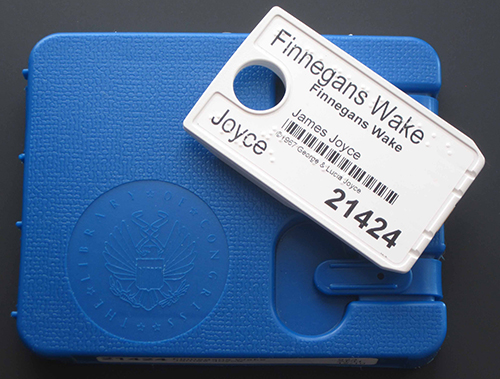
Digital “talking book” cartridge with case.
Photo: JoyceGeek
Finnegans Wake
Read by Patrick Horgan
American Foundation for the Blind, 1985
Unabridged; 26 hours, 58 minutes
Before commenting on this recording, I have to acknowledge my debt to JoyceGeek. A Wakean performer himself, JoyceGeek has been waging a one-man campaign to draw attention to Patrick Horgan’s recording of Finnegans Wake. He makes some excellent points in a post called “Crossing the Deadly Line,” where he names names (mine, justifiably included!) and provides compelling evidence of Horgan’s superiority over Healy in the Battle of the Patricks. Even better, he secured an interview with your man himself! Without JoyceGeek’s original research, the following commentary would be limited to a few paltry sentences. So let’s get to it!
This monumental achievement was the first unabridged Finnegans Wake to be professionally recorded, and has its surprising genesis in a little-known Congressional act. According to the National Federation of the Blind:
In 1931 Congress passed the Pratt-Smoot Act, which authorized the distribution of books to blind and physically handicapped people in the United States through what is now known as the National Library Service for the Blind and Physically Handicapped of the Library of Congress (NLS). “Talking Books” began to be produced in 1934 and were originally recorded on phonograph records; cassette books were produced beginning in 1971. Today recorded books and the equipment to play them are distributed through a network of cooperating libraries throughout the country. Books on all subjects and representing all literary genres, as well as a selection of popular magazines, are available to NLS patrons.
One of the biggest producers of “talking books” in the 1980s was the American Foundation for the Blind, who hired professional actors to record unabridged readings on 1/4-inch magnetic tape. These recordings were made in mono, which allowed the engineers to pack more information onto each tape. One frequent AFB reader was a British expat named Patrick Horgan (1929-2021). A celebrated Sherlockian, Horgan had portrayed the famous detective several times on stage, but was better known for his roles in American soap operas, or as the narrator of Woody Allen’s Zelig. Horgan’s literary enthusiasm went beyond Sir Arthur Conan Doyle—he was also a Joycean, and for that reason the AFB asked him to record two fairly impressive books, Richard Ellmann’s James Joyce and Joyce’s own Finnegans Wake. (How they were convinced to fund either recording is a mystery; I can only imagine they had little idea as the the size and scope of these projects!)
Given the standard amount of time to record a novel with a 600 page-count, Horgan prepared himself with a deep dive into the Wake, devising his own pronunciations and expressive interpretations. The recordings were made over a period of four to five weeks, with Horgan reading in 90-minute blocks. The resulting cassettes were stuffed in a plastic box and made available through the Library of Congress. A quick glance at the original NLS catalog entry confirms suspicions that only Horgan had any idea of what he’d just accomplished:
Finnegan’s wake
By Joyce, James.
A controversial, experimental novel written in 1939. The book is apparently a dream sequence representing one night in the unconscious mind of a dublin tavern keeper. Joyce’s unique style makes extensive use of slang, arcane puns and obscure allusions.
There’s little I can say about Horgan’s Wake that hasn’t been said better by JoyceGeek, and I suggest you read his commentary and interview. Horgan’s dedication to the project is unquestionable, combining the devotion of a student with the professionalism of an actor. There are instances where a listener may question his choice of pronunciation, and Horgan makes a few fumbles; but these pale to mere quibbles in the light of his Herculean success—especially when one considers the amount of time he was afforded was the same had he been assigned East of Eden! (Horgan’s work decoding Wakean sentences was thoughtful enough to earn him an acknowledgment in the fourth edition of Roland McHugh’s Annotations to Finnegans Wake.)
Unfortunately, the very forces that created this remarkable recording now threaten to consign it to the dustbin of history. In the early ‘naughts, NLS “talking books” were transferred from mono cassettes to flash-based digital cartridges. These cartridges require a special player to access, and both player and cartridges are restricted to disabled citizens, who must request them from the Library of Congress. While the system is especially designed for braille readers, there are legal reasons for these limitations as well: NLS recordings are granted a special dispensation from copyright law. According to the U.S. Government Accountability Office:
Under U.S. copyright law, NLS is authorized to reproduce and distribute talking books without copyright infringement as long as they are produced in a specialized format exclusively for use by blind or other persons with disabilities. The standard describing the specialized format for digital talking books is maintained by the Digital Audio-Based Information System (DAISY) consortium—an international organization established to develop specifications and tools for digital talking books—and accordingly is commonly known as the Daisy standard.
This legal restriction, coupled with the lamentable lag in technology so common to government agencies, has created a situation where Horgan’s reading remains woefully obscure. Indeed, if it weren’t for FinnegansWake.org liberating the recording as MP3s, the average reader wouldn’t have any access at all! Hopefully when Finnegans Wake enters the public domain in 2035, the legal situation will change. Until then, the first unabridged recording of Finnegans Wake remains trapped in a Byzantine maze of red tape. Given the modern ubiquity of audiobooks, it seems senseless that the NLS, Penguin, and the Joyce estate can’t reach some kind of commercial agreement—maybe throw Horgan’s recording into the gobbling maw of Amazon and let them sell it for an Audible credit? It’s hard to see who “loses” in this scenario!
Finnegans Wake
Finnegans Wake
Read by Patrick Healy
Lilliput Press, 1995
Also available as: Cassette (Abridged) | CD | Ubuweb MP3
Unabridged; 19 hours, 32 minutes.
Read by Dublin actor Patrick Healy, this unabridged Finnegans Wake was published in 1995 to great acclaim. Many Joycean sources—including the Brazen Head—wrongly believed it was the first unabridged recording of Finnegans Wake, a claim supported by Lilliput’s press materials, which remain uncorrected to this day. Of course, Patrick Horgan’s NLS reading preceded Healy’s by several years, but its limited availability resulted in virtual obscurity. Now that Horgan’s superior reading has been bootlegged and Naxos has published their own unabridged Wake, Healy’s recording has lost its luster, and comparison with similar efforts reveals its flaws in a less-forgiving light.
The main problem with Healy’s Wake is its breakneck pace. Healy was renown for his ability to “speed read” Finnegans Wake, and this set took only four days to record. As a result, Healy frequently rushes through the text. At best, this creates a delirious sense of momentum, transforming the Wake into a torrent of surreal poetry. At worst, Healy sounds exhausted, a disembodied voice trapped in a Beckettian afterlife babbling senselessly to fill the void. At times like this, Healy slips into a dull monotone which renders Joyce’s wordplay unintelligible. He occasionally stumbles over words like rocks in his path; the reader can almost imagine him dazedly shaking his head before continuing his relentless marathon.
Fortunately, Healy seems better rested for the Wake’s more celebrated passages—episodes like “Shem the Penman,” “The Mookse and the Gripes,” and “Anna Livia Plurabelle,” as well as the book’s famous opening and closing passages. These sections are read with an appropriate amount of nuance and drama, and the slower pace allows the listener to better appreciate Joyce’s complex wordplay. Healy’s mastery of Gaelic is also refreshing, and when he’s not exhausted, he follows the twists and turns of the Wake’s Protean text like Menelaus bucking the wily sea-god himself. Having said that, even at its best, Healy’s reading suffers from a general lack of humor. There are several passages were a lighter touch would’ve been more appropriate—one thinks of the airy lilt Joyce brought to “Anna Livia Plurabelle,” the charming palaver of Cyril Cusack’s “Shem the Penman,” or the joyful good humor of Jim Norton’s reading for Naxos. There’s also the price tag to consider. The set has never been digitized, and is not available through Amazon or Audible—one must pay the exorbitant price of €275.00 to order a physical copy from Lilliput Press! Fortunately, the set has been bootlegged, and MP3s may be found on Ubuweb.
Publisher’s Description: Patrick Healy is a Dublin-born writer and scholar, has performed readings of Finnegans Wake in Dublin, London, and Paris. His publications include Up in the Air and Down (a novel) and Goldtooled Bookbindings Commissioned by Trinity College Dublin in the Eighteenth Century. He is editor of Max Raphael’s collected works in English. In January 1992 Patrick Healy read the complete text of James Joyce’s Finnegans Wake in Bow Lane Recording Studios, Dublin, over a four-day period. Finnegans Wake had never been recorded in its entirety [sic] despite Joyce’s recommendation that the text should be heard rather than read. The unabridged twenty-hour recording is released in a box-set of 17 compact discs with a limited run of 1000. Each set is accompanied by Healy’s 128-page book, The Modern and the Wake, featuring key essays on Finnegans Wake and its performance. Healy’s work affords unique access to one of English literature’s most difficult but rewarding literary achievements of the twentieth century.
Finnegans Wake (Abridged)
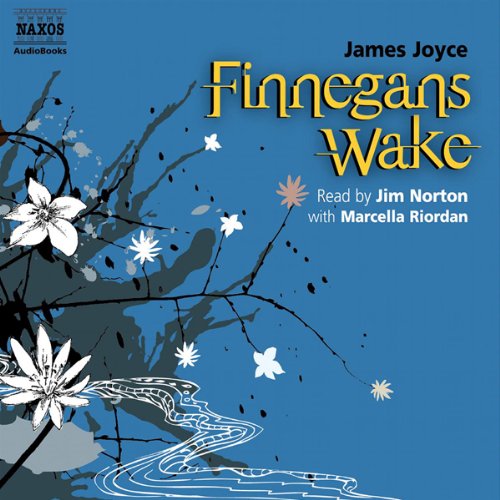
Finnegans Wake (Abridged)
Read by Jim Norton & Marcella Riordan. Music programmed by Roger Marsh.
Naxos, 1998
Abridged; 5 hours, 10 minutes.
In 1998, Irish actor Jim Norton was starring in Conor McPherson’s The Weir. When the play came to Dublin, Norton agreed to something quite astonishing. From 9:30 am to 5:30 pm, he would record the most notoriously-difficult-to-read book in the world for Naxos. He would then scoot over to the Gate Theatre to become “Jack,” the role for which he earned a Laurence Olivier nomination. After taking his bows, he’d retire back to his hotel to practice reading for the following day. Once the sessions were complete, composer and producer Roger Marsh added “ALP” readings by Irish actress Marcella Riordan, who’d played Molly to Norton’s Leopold on the Naxos Ulysses. (Riordan also portrayed Gerty McDowell in Anthony Burgess’ Blooms in Dublin.) After programming multiple sound effects and musical cues, Marsh abridged the recording to five hours.
The result is pure magic. Even though it’s abridged, this is my favorite reading of Finnegans Wake. The recording begins with Jim Norton singing the traditional ballad “Finnegan’s Wake” to the sound of a burbling river. Norton takes the reading much slower than Patrick Healy, and appears to be enjoying himself considerably. Simply put, there’s more blarney in his voice, and he’s wonderfully sensitive to the humor of the text—Joyce’s chorus of Aristophanic frogs has never sounded croakier! Norton invests each character with their own quirks and mannerisms, and his “Mutt and Jute” is delightfully offbeat.
As with the Naxos Ulysses, Norton’s talent is matched by the great Marcella Riordan. Her reading of “Anna Livia Plurabelle” is a bravura performance, her washerwomen split into opposing channels and bickering at a whiplash pace. Roger Marsh preludes the sequence with his own musical setting of “ALP,” the haunting Not a Soul But Ourselves. Riordan returns at the conclusion of the set, where her voice begins overlapping Norton’s narration at the line, “Well, we have frankly enjoyed more than anything these secret workings of natures…” As Norton falls silent, Riordan continues the narration until the final broken sentence.
Unfortunately, thanks to copyright laws that even Naxos has complained about, this magnificent set is not available for purchase in the United States! The Amazon link takes you to Amazon.uk, where British and Irish visitors may download the book through Audible. It’s also possible to find the 4-CD set or cassettes available through eBay. If anyone is having problems obtaining a copy, the Brazen Head can help—just drop us a line! For those interested in reading more about this recording, Nicolas Soames’ Naxos blog offers some interesting details.
Publisher’s Description: riverrun past Eve and Adam’s, from swerve of shore to bend of bay, brings us by a commodius vicus of recirculation back to Howth Castle and Environs… So starts Finnegans Wake, the greatest challenge in 20th century literature. Who is Humphrey Chimpden Earwicker? And what did he get up to in Phoenix Park? And what did Anna Livia Plurabelle have to say about it? In the rich night time language of dreams here is history, anecdote, myth, folk tale—and above all, a wondrous sense of humour coloured by a clear sense of humanity. In this exceptional reading by the Irish actor Jim Norton, with Marcella Riordan, the world of the Wake is more accessible than ever before. The abridgement, made by the composer and Joyce enthusiast Roger Marsh, is presented with the text, allowing the listener to get deeper into Joyce’s labyrinth by both aural and visual means. Jim Norton, the distinguished Irish actor reads. His performances of both Ulysses and A Portrait of the Artist as a Young Man demonstrate his particular sympathy for the author—helped by a childhood in the heart of Dublin where Leopold Bloom and James Joyce walked. For the first time ever, a performance of Finnegans Wake that sets out to entertain, amuse and inform, rather than bemuse. While scholarly in its background, this adaptation by Roger Marsh for audiobook seeks to show that the enjoyment of this great work does not have to start and stop with the first paragraph.
Finnegans Wake (Excerpts Read by Patrick Ball)
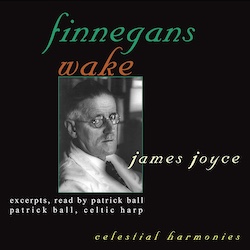
Finnegans Wake (Excerpts Read by Patrick Ball)
Read by Patrick Ball
Celestial Harmonies, 2007
Also available as: MP3 | YouTube
This 2-CD set contains excerpts from Finnegans Wake read by Patrick Ball, the Chieftains’ celebrated harp player. Ball has a smooth, pleasant voice—are you particularly surprised?—and his reading has a lovely melodic quality. Nevertheless, Ball’s interpretation lacks the sophistication and nuance of more experienced readers such as Patrick Horgan, Jim Norton, and Barry McGovern. Ball occasionally glides over the surface of Joyce’s prose without illuminating its depths, trading meaning for musicality. At times he seems to miss the point of a Joycean pun, or fails to understand an allusion. For instance, Ball’s chorus of Aristophanic frogs feels like a string of random syllables, and his first 100-letter thunderword is too cautious, more a thorny maze than a collapsing world. To be fair, Ball makes no pretentions of scholarship, and his comments on the Wake reveal a refreshing humility. His references to Joseph Campbell and John Bishop show that he’s done his homework, but he confesses a genial mystification with the Wake—a confusion most Joyceans are sure to find relatable! Ball’s Finnegans Wake is neither professional audiobook recording nor hermeneutical analysis; but a labor of love, and is best approached as such.
And besides, most listeners are here for Ball’s harp, not his acting chops, and his musical talent remains beyond reproach. Ball frames each reading with billowing curtains of music, lyrical runs and soft, twinkling notes. An expert on traditional Irish music, he archly quotes from relevant tunes like “Finnegan’s Wake” and “Mush Mush.” For those Joyceans wary of the atonal caterwauling or rampant experimentation the Wake seems to license in musicians, Ball’s genteel and melodic excursion offers a relaxing diversion, sure to please fans of the Chieftains and Irish trad in general.
Contents:
Disc 1
1. riverrun (p. 3-10)
2. good Mr. Finnemore (p. 24-29)
3. Shem (p. 169)
4. O tell me all (p. 196-201)
Disc 2
1. Well, you know (p. 213-216)
2. Three quarks (p. 383-386)
3. Jaunty Jaun (p. 429-439)
4. Anna Livia Plurabelle (p. 619-628)
Publisher’s Description: Following Patrick Ball’s award winning spoken word debut Storyteller: Gwilan’s Harp and other Celtic Tales, comes a rare reading of the great manuscript Finnegans Wake by James Joyce. Published in 1939, Joyce received grave criticism for the Wake which he labored one-third of his life on, largely because the work was before its time, impenetrable by most, if not all readers. With Joyce’s sudden death six months later, it has become a masterpiece of sorts for the world to decipher. Penetrable or not, Finnegans Wake clearly speaks to the very heart of the Irish and perhaps to the very soul of man. Riddled in the Irish folkloric tradition of wordplay, Finnegans Wake reflects Joyce’s Irish love of words and tremendously keen ear for the power and music they acquire when spoken. Says Ball, “I found that when the Wake is read aloud, various layers of meaning emerge from the sound of the words: indeed, some startling revelations emerge when the rhythms, the puns and the dialects are spoken.” The first section, riverrun, is indispensable: the first notes of the great allegorical symphony that is to follow. The following tracks introduce the characters who represent the various aspects of the family of man. Anna Livia Plurabelle completes this great cycle and happens to be one of the most sublimely beautiful passages in modern literature. As Ball eloquently summarizes, “Hard to understand, and still mostly obscure to me, but the sound of the words and the phrasings are lovely. And the theme is timeless: the river flowing back to the sea, where it will eventually rise into the sky and fall again as rain on the Wicklow Hills where the river has its source. That image is Joyce’s basic theme, I suppose. As Joseph Campbell put it, ‘James Joyce presents, envelops, amplifies and recondenses nothing more nor less than the eternal dynamic implicit in birth, conflict, death, and resurrection.’” With Ball’s understanding and love for the Irish wordplay combined with his expertise in traditional Irish music he seamlessly blends the Celtic harp with each piece emphasizing the music of the words.
Finnegans Wake
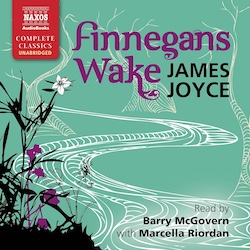
Finnegans Wake
Read by Barry McGovern & Marcella Riordan. Music programmed by Roger Marsh.
Naxos, 2021
Unabridged; 29 hours, 18 minutes
In 1998, Naxos released a 4-CD abridged Finnegans Wake read by Jim Norton and Marcella Riordan. Unfortunately, due to copyright laws, the set could not be sold in the United States. Some twenty years later Naxos decided to kill two birds with one stone, and released an unabridged Wake that could be sold world-wide. Once again turning to Joycean composer Roger Marsh to produce the set, Naxos asked Irish actor Barry McGovern to read the passages formerly recorded by Jim Norton. Celebrated for his many Beckett roles, McGovern brought an intimate understanding of Irish cultural history to the recording sessions. As Roger Marsh writes in a Naxos blog post:
…it helps to be starting out with a reader who is already fully immersed in the work. I thought I knew quite a bit about Finnegans Wake, but every day and every hour of our recording sessions Barry McGovern taught me more. Yes, he is a Dubliner—from Chapelizod no less: the very village where the Wake’s central characters reside—but he is also a linguist and musician whose knowledge of the Irish language and Irish popular song I couldn’t begin to rival. And those are very valuable competences when tackling this novel; they help to unlock many seemingly obscure phrases and references. He is also, of course, a consummate actor with a voice that exudes authority, and with an impeccable ear for accents.
Finnegans Wake really has to be heard… Joyce’s characters are mostly Irish, and sometimes we can assume they are Dubliners, but often they are not, and usually we are left to pick up clues as best we can: a Norwegian ship’s captain, an American detective, and the omnipresent four inquisitors who hail from Belfast, Dublin, Galway and Cork respectively, though Joyce doesn’t tell us that very clearly and certainly doesn’t make it easy for us to decide which of them is talking at any single point. Probably Barry’s most frequent question during the recording sessions was: ‘now, wait a minute—which one is this?’. It matters, because their accents are so markedly different.
The novel is also full of musical references. How do we deal with those when reading? If the writer quotes a few words from a song—and if we know the song and recognize those lyrics—do we hear the melody in our head? In Finnegans Wake there are hundreds of quotations or paraphrases of well-known tunes like D’ye ken John Peel. Do we hear it? And what about the less well-known songs, like She is far from the land? Frequently Barry would ask me ‘now this is from a song, will I sing it?’ I wouldn’t have known.
Jim Norton’s joyous reading remains my favorite, but Barry McGovern’s Wake is a worthy successor. A consummate storyteller, McGovern treats Finnegans Wake as a story, rather than poem, puzzle, riddle, or religion. He invests the Wake with a fine sense of drama, his multiple characterizations, accents, and changes in style sensitive to what’s actually going on in the text, rather than simply responding to Joyce’s dazzling wordplay. He’s aided by a generous running time: three hours longer than Horgan’s reading, and ten hours longer than Healy’s torrential monologue! Once again, Marcella Riordan returns for the “female” parts of the Wake, her voice a little older and perhaps wiser. While I prefer her 1998 reading of the final few pages—she conjures a hushed reverence missing from this reading—her performance is still terrific, and few listeners will be able to tell the difference.
Wisely, Roger Marsh doesn’t fix what’s not broken, and employs the same effects that enlivened the previous set—the beginning ballad of “Finnegan’s Wake,” now sung by Barry McGovern, the musical interludes, and the overlapping of male and female voices on lines 615.12-15. Like all Naxos audiobooks, the set is conveniently indexed and comes with a detailed PDF booklet. This unabridged set is more than just “highly recommended”—go spend that Audible credit laying around your account!
Incomplete Readings
Simon Loekle’s Finnegans Wake
In 1996, Simon Loekle began reading Finnegans Wake on WBAI’s As I Please: The Year-Out Wake Show. Unfortunately, his death in 2015 cut the project short. Once again doing God’s work, JoyceGeek has archived and organized all of Loekle’s readings on a single page. These readings are wonderful, the perfect combination of Joycean scholarship and dramatic sensibility. Highly recommended!
The Most Ever Company’s Wake
A YouTube project by The Most Ever Company, a Tulsa art collective. The Wake is read with enthusiasm and joy, and each video allows the listener to read along with the text. Definitely worth a subscription!
Joyce Audio
[Main Page | His Own Voice | Collections | Dubliners | Portrait | Ulysses | Finnegans Wake | Drama & Poetry | Biography & Criticism | Miscellany]
Author: Allen B. Ruch
Last Modified: 15 June 2024
Main Joyce Page: The Brazen Head
Contact: quail(at)shipwrecklibrary(dot)com


